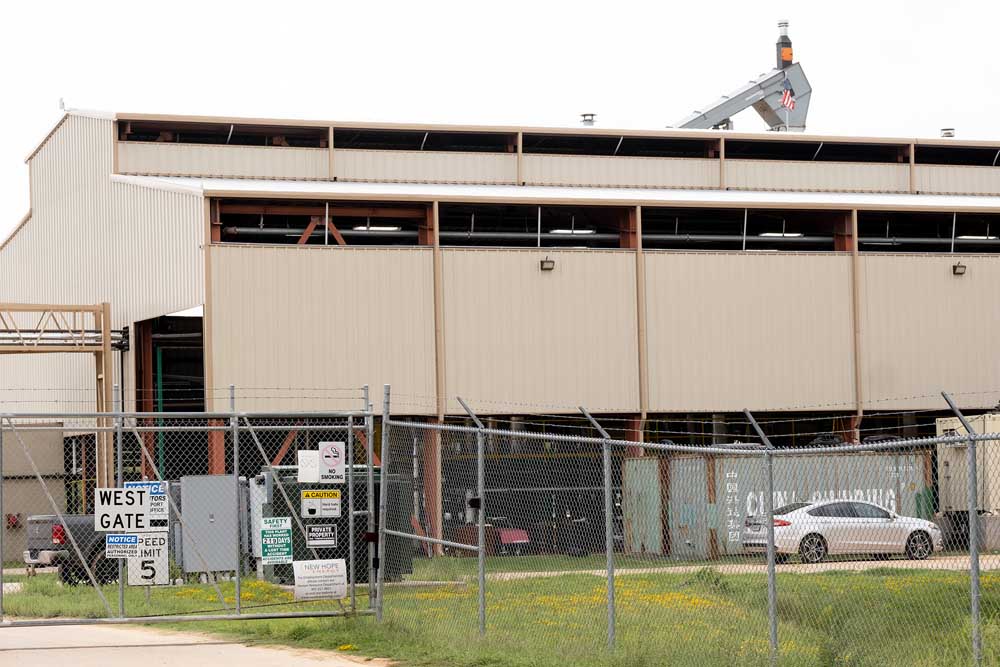Fourth fire in three years at East Texas plastics recycling plant
Published 5:45 am Saturday, October 7, 2023

- New Hope Energy at 1775 E Duncan Street in Tyler on Wednesday October 4, 2023. (Michael Cavazos/News-Journal Photo)
An East Texas plant that turns waste plastics into “usable product” recently experienced its fourth fire in the past three years.
The Tyler Fire Department responded at 8:52 a.m. Sept. 30 to a report of a fire at New Hope Energy, 1775 Duncan St. in Tyler.
Trending
When they got there, firefighters found plastics and vegetation burning, said newly appointed Tyler Fire Marshal Joey Hooton.
A New Hope employee told fire department dispatchers at 8:56 a.m. there were explosives in the building, according to the department’s report on the blaze.
“Nitrogen tank close to fire (…) It’s approaching containers moving fast,” continued the minute-by-minute report between dispatchers and fire crews.
The crews extinguished the blaze, and a fire suppression system built into the recycling facility contained the fire around the building, Hooton said.
“As the product flowed downhill, it ignited vegetation around it,” he said. “Our guys created a dam to keep it from running, from traveling any further, and as the product started cooling, it became rigid. That plastic started to harden again. The product appeared to be contained to the property.”
The cause of the fire was unknown and remained under investigation this past week, Hooton said.
Trending
The Tyler Fire Department also was called in May 2020 to extinguish another blaze at the facility. In that incident, crews doused a plastics reactor — described as a low-pressure chamber — with firefighting foam to cool the overheating tank.
“Packing” below the base of one of the reactors ignited six months later, according to another fire department report on the facility.
In June 2023, combustible fluid ignited at the facility and activated the automatic extinguishing system. The fire department reported employees “were cooling the reactor that had direct flame impingement.”
Tom Sheehy, New Hope Energy’s director of sales, said the fires were not a result of the novel recycling process, which generates heat upwards of 900 degrees.
“These weren’t created because of the technology,” he said. “The fires and the technology are separate.”
A follow-up statement by the company clarified the Sept. 30 fire was caused by the failure of a backup maintenance valve and that there was no injuries or damage to equipment.
The statement further added that the Texas Commission on Environmental Quality performed an inspection the day of the incident, and no violations were issued.
However, the TCEQ clarified in an emailed statement that the onsite investigation took place Oct. 3 and the investigation is ongoing and not resolved.
A separate complaint filed to the TCEQ in 2021 regarding mismanagement of hazardous waste was investigated by the state agency in November of that year.
The investigator listed three separate failures at the New Hope facility to clearly label hazardous material in addition to other violations pertaining to hazardous waste determinations.
Scattered barrels around the plant were visible from satellite images taken before the 2021 investigation.
No enforcement actions, including fines and fees, have been filed against the plastics recycling facility by the TCEQ as of Thursday afternoon.
Controversial technology
Tyler-based New Hope Energy began operating the plant in 2018. The facility employs a technology called pyrolysis to heat waste plastics and turn them into fuel or chemical feedstock used in industrial processes.
“We convert more of our waste to usable product than anybody else,” around 97%, Sheehy told the Tyler Morning Telegraph in 2022.
New Hope Energy announced a partnership with Paris-based TotalEnergies in 2022 to scale up operations in Tyler and make the plant the largest of its kind in the world. The plant expansion is anticipated to wrap up in 2025.
And this year, the technology was heralded by the American Chemistry Council, a trade group for the chemical industry, “as a critical part of the solution to a circular plastics economy.” New Hope Energy is a member of two ACC industry sub-groups.
However, environmental groups are less convinced by some of the sustainability claims made by the chemical industry when it comes to pyrolysis.
The National Resources Defense Council, an environmental advocacy group, listed a number of concerns with the technology in a 2022 report tied to previous academic studies.
“(Pyrolysis) may cause fires at plants due to high heat, generates large quantities of hazardous waste, and creates fuels whose burning generates the same harmful air pollutants as burning fossil fuels,” the report stated.
The National Resources Defense Council also highlighted how the sites tend to be in lower-income communities.
The area surrounding the New Hope plant had the second-highest percentage of households making less than $25,000 of the facilities examined in the report.
Another environmental group, GreenPeace, argued that terms like “plastics recycling” and “the circular plastics economy” are misleading.
A GreenPeace report from 2020 found that “ACC member Dow Chemical Company, a leading promoter of pyrolysis waste-to-fuel processes, initially called its process ‘recycling,’” but later retracted the recycling description after encountering criticism from a recycling coalition.
Dow, which also has partnered with New Hope Energy, eventually stated that, “We agree. It’s not recycling.”
Scrutiny involving pyrolysis also is beginning to intensify inside the federal government.
The Environmental Protection Agency released a draft proposal in June for regulation of the new technology. The regulations would pause operations at plants until the agency has conducted a thorough review of a given facility and evaluated risks to public health and the environment.
Last month, the American Chemistry Council published a statement opposing the draft regulations.
“The ACC and our members remain eager to inform the EPA and other decision-makers about advanced recycling and clarify misconceptions being spread by its opponents and foster a more constructive path forward for this important manufacturing process,” the statement said.






